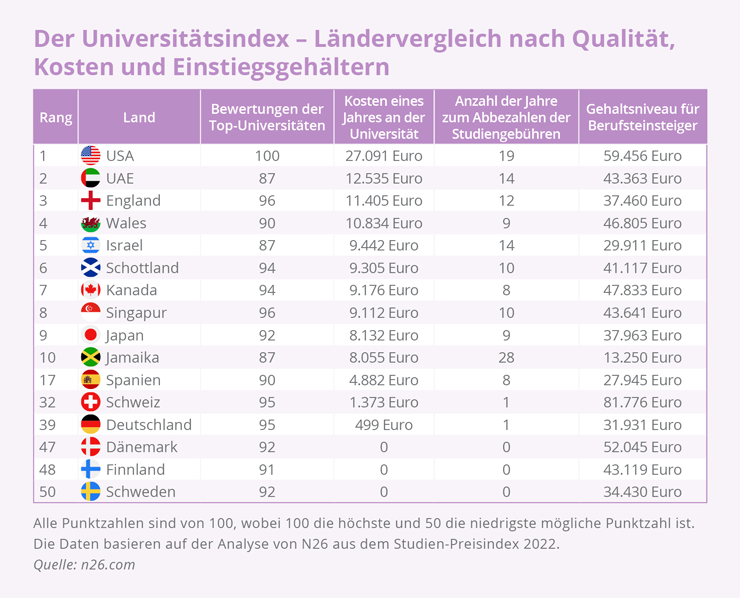Studying worldwide: How expensive is studying abroad?
The prices for education can vary significantly, not only from one field of study to another but also across different countries. To help students make informed financial decisions about their education, the mobile bank N26 has analyzed the costs of studying medicine, nursing, law, civil engineering, software development, and teaching in 50 countries worldwide.
The United States ranks at the top of the list, and the study also provides insights into the average salaries for graduates of these programs in their respective countries. It evaluates 100 popular study destinations based on the quality of life and the cost of living.
Changes in the higher education landscape
Higher education has undergone significant changes in recent years, with the traditional in-person learning approach receding, particularly due to the COVID-19 pandemic. The popularity of online learning and remote education has surged. As the COVID-19 restrictions are largely lifted, a new generation of students is preparing for university. To support them, N26 Bank has created a Study Price Index, which meticulously examines the cost of education worldwide. This index aims to assist students in making financially sound decisions about their future. The study also compares data on the cost of living, tuition fees, student debt, and entry-level salaries for graduates in six globally comparable fields of study.
Increased number of university graduates
Around 40 per cent of the world's population complete tertiary education after secondary school - the highest proportion ever measured. Higher education can provide better career opportunities and higher income, but it also comes at a significant cost. Some countries have no tuition fees or students only have to pay administrative fees, while others charge tuition fees, the amount of which depends on whether the university is public or private. Together with the cost of living and other expenses, the cost of studying can quickly reach a considerable amount.
Analysis of universities in 50 countries
For the calculation, the costs of a university degree in 50 countries were examined. The selection was based on the level of awareness of the universities and the availability of comparable study data. In addition, tuition fees, the cost of living and the quality of life in different places in the world were included in the analysis. At the same time, the potential financial "outcome" of the degree programmes was considered, for this purpose the usual salaries for graduates in the respective subject were included.

The study also provides information on how affordable higher education is in the individual countries. For this purpose, it was calculated how long it takes to pay back tuition fees on average and how long it takes to work for minimum wage.
USA tops the list for the cost of university studies
The data from the analysis shows that studying in the USA has the best ratings for the top universities with 100 points. However, this is also associated with high costs should one decide to study there. A year at university here can cost around 27,091 euros, which means that it takes an average of 19 years to pay off these fees. On the other hand, the salary level at the start of a career is around 59,456 euros.
The United Arab Emirates (UAE) ranks second in the analysis in terms of the cost of university studies. Here you pay 12,535 euros for one year of study, which takes about 14 years to pay off. In third place is England with a top university rating of 96. One year of study costs 11,405 euros. Universities in the USA and also in Great Britain have long been distinguished in terms of quality. And occupied the highest ranks of the "Times Higher Education Ranking".
Japan and Jamaica land in ninth and tenth place. The costs for an academic year are very similar here, at 8,132 euros (Japan) and 8,055 euros (Jamaica). However, there is a big difference in the starting salaries, which are only 13,250 euros in Jamaica. It is not surprising that it would take 28 years to pay off the tuition fees.
Studying in Europe is not as expensive
In Europe, Spain ranks 17th and Switzerland 32nd. In Spain, the cost of an academic year is 4,882 euros, whereas in Switzerland it is 1,373 euros. There is an enormous difference in the starting salary between the countries. In Switzerland it is three times as high (81,776 euros) as in Spain (27,945 euros). The cost of living in Switzerland is extremely high, which could explain this starting salary.
Germany is in 39th place with a rating of 95 out of the top universities. The tuition costs per year are about 499 euros and it only takes one year to pay them off. The starting salary (31,931 euros) is not particularly high considering the increased costs of housing and food.
The Scandinavian countries are at the bottom of the ranking. In Denmark (47). Finland (91) and in Sweden there are no costs for the academic year.


